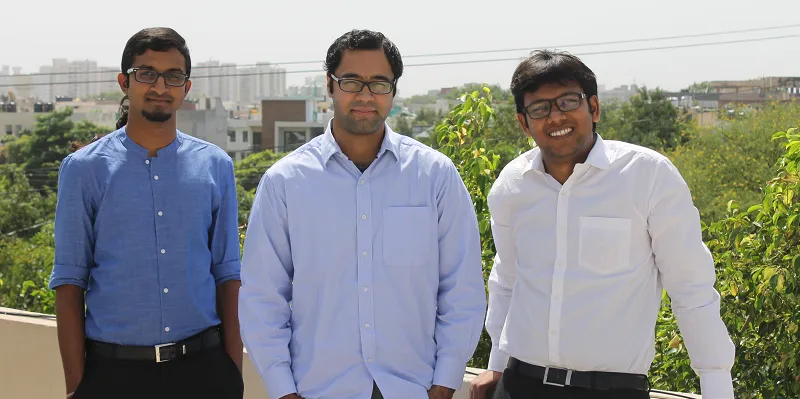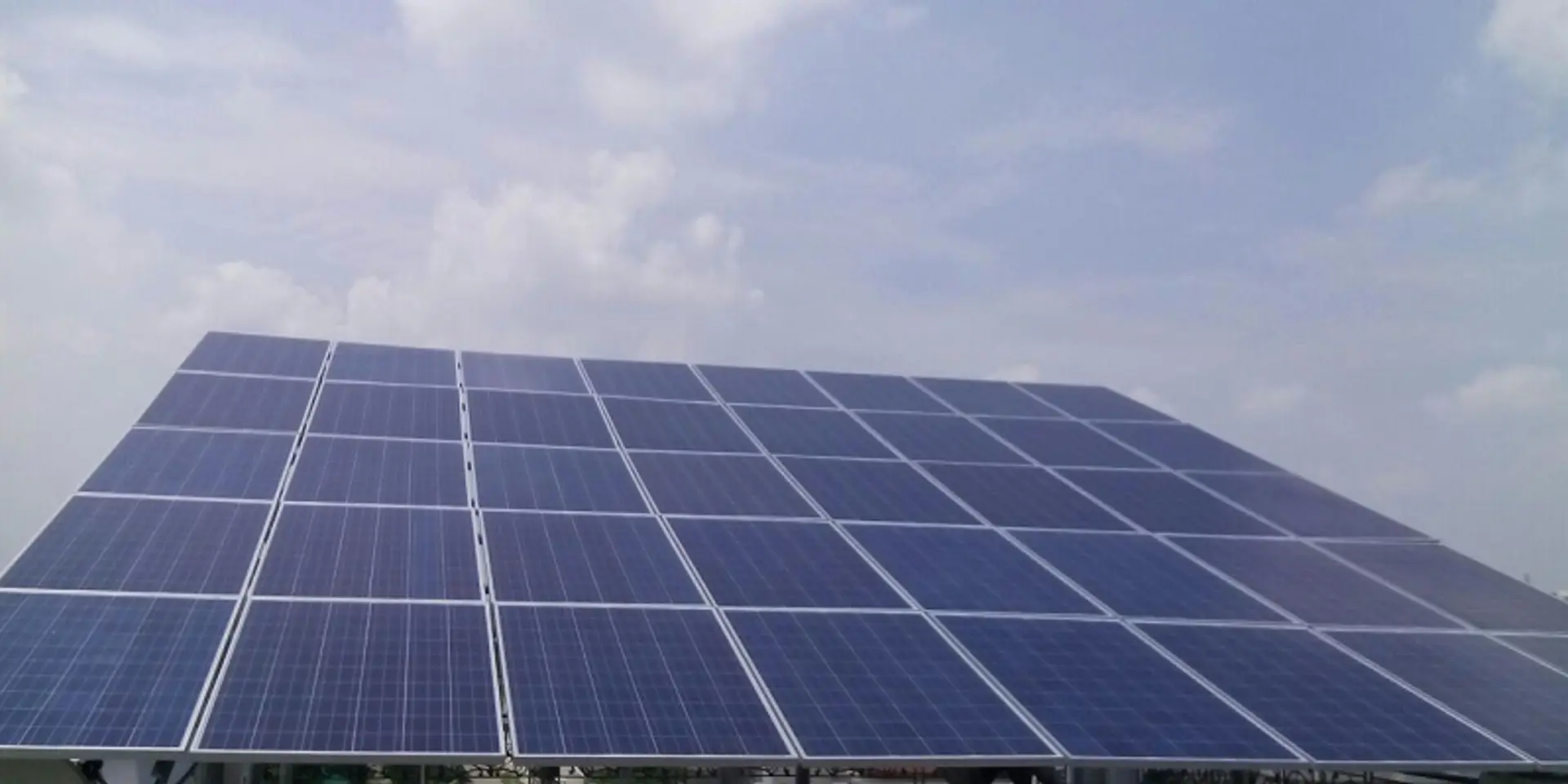Clean and affordable energy: 8Minutes is on a mission to revolutionise the solar energy sector
The first question that Dev Arora asks me when I get on the phone with him and his Co-Founder Anuj Gupta, is, “Can you tell me why did we chose the name 8Minutes?” Stumped for a second, because I had assumed that I would be the one shooting questions at them. I knew that their venture was in the solar energy space and then all those years of science came to my rescue. I answered, “Because it takes about eight minutes for the sun rays to travel from sun to earth?” Delighted, Dev said, “Yes! That’s right. Eight minutes and 20 seconds to be precise.”
The three musketeers
Dev studied computer science at NIT, Kurukshetra, following which he worked at GMR airports for two years as an airports consultant. He then joined a Silicon Valley startup in Delhi called Qlicket, where he plunged himself into the startup culture. The excitement of solving a relevant problem excited him. He then took a break to figure about the next big problem he wanted to take on.
Anuj is from Ramsisar, a small village tucked in Rajasthan. The boy worked hard and got through NIT, Jaipur. He says, “I always had a bigger dream and a trust to achieve it. Maybe that’s why even when I had no proper schooling available, no coaching facility, I knew that my hard work would pay.” A bright bulb who topped his school every single time wanted something more from life. While his friends were opting for the IT giants after engineering, Anuj opted for a completely different profile – business development executive at GMR Airports. This is where he met Dev, who he calls his partner for life.
Arjun is the third Co-Founder. An economics graduate from St. Xavier’s College, Mumbai, he worked for a multi-national strategic communications company called Penn Schoen Berland for two and a half years. He decided to jump off the corporate bandwagon in May 2014 to embark on travel to find his true calling. He says, “I realised through the course of my adventures that I was truly passionate about fighting for the planet. So in the course of a year it went from saving the environment, to working against climate change to renewable energy and finally focussed on solar energy.” Dev met Arjun at a climate change conference in February this year.

The big problem
The three of them wanted to work on a problem that truly solved a big problem. Anuj adds, “We identified the biggest problem our planet faces today – climate change. What was the best way to solve this problem? To change the way people consume energy, and redefine our existing business models to help clean energy beat dirty energy. We searched for companies who were doing this in India and could not find anyone who had clearly identified the problems in the sector, and was working on finding solutions that could scale.” Therefore, they set about solving the problem themselves.
Even though they had no relevant experience in solar energy, they were determined to apply their learnings from IT and its innovative business models and wanted to bring what they learned from the computer revolution to energy.
Solar energy has been there for a while. Why is now the time?
Dev draws analogy with the computer revolution in the 80s. He says that the computer revolution happened in the 80s because computers went from being bulky, giant, slow, expensive, and hard to understand machines to now a device that would sit on your table – compact, efficient, and affordable enough for the average consumer to buy. He adds, “It didn’t happen overnight.”
He further explains that while solar has been around since the late 50s, it is this year, 2015, when solar has reached a size which can be installed in all homes. He adds, “It has become more efficient, and it’s affordable enough to recover your money in about five years. The technology has become extremely viable for investment, and we can infact, sell the energy generated by solar at a more competitive rate that what you would be paying to your electricity company.”
Anuj, Arjun, and Dev call this “reaching grid parity” – when an alternative source of power is less than or equal to the price of purchasing power from your electricity company, measured over the span of the lifetime of source.
How is 8Minutes doing it?
Once a customer contacts the team, they ask them to submit their electricity bills for the last one year, and ask them to share their geo-coordinates with the team so that they can take a look at their rooftop from the satellite. Team 8Minutes gets back to the customer with a complete assessment, which details the personalised energy savings report. This helps the customer understand his/her requirement and hence pick the size which needs to be installed on their rooftop, and a few technical details to help them understand everything they need to know about purchasing their new solar system.
This report includes the three financing options that 8Minutes offers. The first is ‘minute purchase,’ where the customer buys the solar system with full upfront cost and enjoys free energy produced by the system. The benefit is that the customer can save upto 90% on their electricity bill every year, and avail subsidies or tax incentives from the government.

The second is ‘minutes lease’ – the customer makes a downpayment of the cost of the system and takes the remaining as a loan from the bank – much like buying a car. The benefit is that the monthly EMI will be less than the electricity bill, with the added benefit of subsidies and tax incentives.
The last option is ‘minute power’ – customer pays zero cost to have the solar system installed on their rooftop, and simply pays for the power that is produced by your system every month. Dev says that this model is popular with homes and businesses since the customer is paying lesser than what the government is charging. Dev adds, “Our customers sign a 20-year power purchase agreement with us to purchase clean power.”
Impact, revenue, and competition
The team tells us that in the first six months, they’ve signed on about 865kW – including educations institutions, industries, corporates, and societies and homes.
At present, 8Minutes has third party investors who invest to claim accelerated depreciation tax benefits from solar who invest in their sites. They are now in the process of raising debt from banks and investors to start financing their sites themselves and expand their presence to the top five cities in India. Dev talks about competition, “There’s giants like Tata’s, Sun Edison, Reliance in the market – but they are focusing on utility scale solar parks. Rooftop is a very nascent market, and we see ourselves as the first one to have a major market presence in India’s top five cities.”
Challenges
The team says that their foremost challenge is to find innovative ways to scale faster. They are haunted by the question – with the limited resources we have, how can we impact the maximum number of people? Anuj says, “Solar is still a nascent sector – people still haven’t picked up the technology, and are afraid to take such a big decision for their organisation. We feel we need to spend about three to six months to simply nurturing the person, with multiple rounds of meetings, demos, negotiations, etc. People are very resistance to change. We are in the stage of finding the early adopters, the ones who truly acknowledge the true value of a product, and open it for the world to see. It’s like when you get solar system on your rooftop, your entire neighbourhood knows – we make sure it’s nicely visible for your rooftop. They’d ask for your reviews, probably go up and touch the panels, and finally take a look at your electricity bill to see if this thing really does what it’s supposed to! These people are the followers, who will convert with minimal effort, just by taking the demo from the early adopters, and help us scale. Finding the early adopters for us right now is the biggest challenge.”
We dream a dream
We ask about their five year roadmap, pat comes the reply, “In five years, we are going to be a residential solar company. You will see 8Minutes mini-vans on roads to help switch another home to solar. People will become familiar with the technology, and solar will become a shelf product which can simply be ordered through our website, with a customised financing option to suit your pocket, and installed over the weekend at your home. You’d see these majestic black crowns as you drive by on every home, and every home, every building that will be built will need to make space for clean energy.”
It’s a win–win for customers and the environment. When you flip on your switch today, the electricity travels hundreds of kilometres to reach the thermal power plant which produces your energy. This energy is inefficient (it has up to 30% transmission losses), sometimes uses fossil fuels, pollutes the environment and you pay a higher price to buy power each year as the prices of coal go higher. With solar, you are harnessing the power from the sun, right from your very own rooftop space – it’s very efficient, it clean, and it’s cheaper than what you pay to the electricity company.
The team also wants to use solar as a means to empower those who have been left out of even the conventional energy paradigm. Solar is the easiest way to leapfrog the existing gap in infrastructure and enable us to light up a billion more lives.







